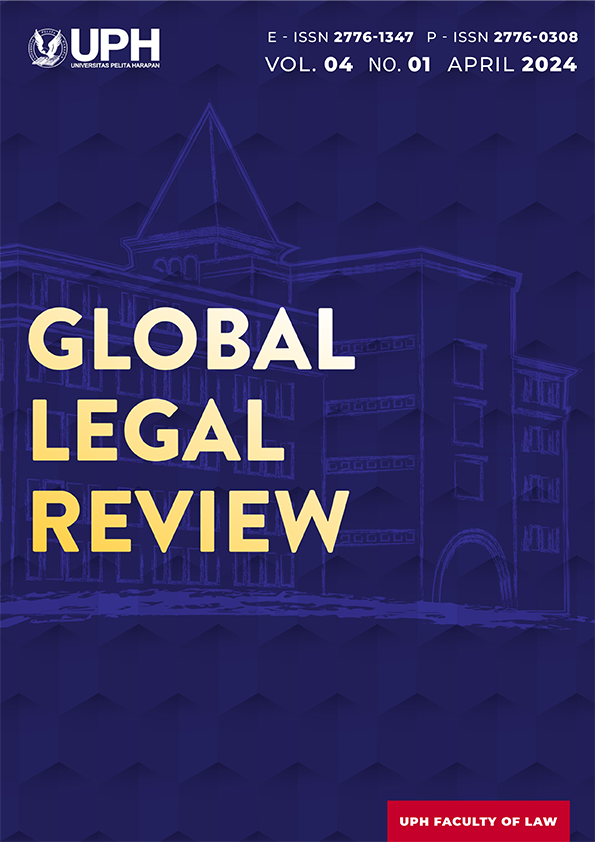Parate Execution After the Indonesian Constitutional Court’s Judicial Review of Fiducia Law and Mortgage Law
DOI:
https://doi.org/10.19166/glr.v4i1.6628Keywords:
Fiducia Security, Mortgage Rights, Parate Execution, Indonesian Constitutional Court (MKRI) DecisionAbstract
According to the Law No. 42 of 1999 on Fiducia Security (“Fiducia Law”) as well as the Law No. 4 of 1996 on Mortgage, if there is a breach of fiduciary guarantee and mortgage rights, the secured creditors can undertake a parate execution, as the expedient, simple and cost-efficient method by means of a public auction. However, the Indonesian Constitutional Court’s (MKRI) Decision Number 18/PUU-XVII/2019 has interpreted Parate Execution of Fiduciary Guarantee must firstly obtain the debtor’s consent that a breach has indeed occurred and the voluntarily surrenders of the guarantee object to the creditor. On the other hand, in the Decision No. 21/PUU-XVIII/2020, MKRI did not define the same process for Parate Execution of Mortgage Rights. From the substance point of view, the two MK verdicts provide a different interpretation of the principle of “pacta sunt servanda” and fiducia security. This has caused the execution of Fiduciary Guarantee becomes not easy, expedient and cost efficient any longer. This normative research attempts to analyse the legal and economic impact of the two verdicts and their implementation from a law and justice perspective. The results show the need of consistency in the implementation of Parate Execution for both. This means that an agreement regarding the existence of a breach is not required. In addition, if the debtor does not voluntarily surrender the guarantee object, then the creditor by law reserves the rights to seize the object. Arguably, it is necessary to amend the Fiducia Law in accordance with the MKRI’s Decisions, in line with the general principles of security in parallel with the principles of justice, legal certainty and utility.
References
Harahap, M. Yahya. Segi-Segi Hukum Perjanjian. 2nd ed. Bandung: Penerbit Alumni, 2017.
HS, Salim. Pengantar Hukum Perdata Tertulis (BW). Jakarta: Sinar Grafika, 2008.
HS, Salim. Perkembangan Hukum Jaminan di Indonesia. Jakarta: PT. Raja Grafindo Persada, 2013.
Mangesti, Yovita A., and Bernard L. Tanya. Moralitas Hukum. Yogyakarta: Genta Publishing, 2014.
Miru, Ahmadi. Hukum Kontrak dan Perancangan Kontrak. Jakarta: Rajawali Pers, 2007.
Muslih, M. "Negara Hukum Indonesia Dalam Perspektif Teori Hukum Gustav Radbruch (Tiga Nilai Dasar Hukum)." Legalitas: Jurnal Hukum 4, no. 1 (2013): 130-152. http://legalitas.unbari.ac.id/index.php/Legalitas/article/view/117.
Satrio, J. Parate Eksekusi sebagai Sarana Mengatasi Kredit Macet. Bandung: PT. Citra Aditya Bakti, 1993.
Siahaan, Maruarar. " Peran Mahkamah Konstitusi Dalam Penegakan Hukum Konstitusi." Jurnal Hukum IUS QUIA IUSTUM 16, no. 3 (2009): 357-378. https://doi.org/10.20885/iustum.vol16.iss3.art3.
Tanya, Bernard L., Yoan N. Simanjuntak, and Markus Y. Hage. Teori Hukum: Strategi Tertib Manusia Lintas Ruang dan Generasi. Yogyakarta: Genta Publishing, 2013.
Wantu, Fence M. "Kendala Hakim Dalam Menciptakan Kepastian Hukum, Keadilan, dan Kemanfaatan di Peradilan Perdata." Mimbar Hukum 25, no. 2 (2013): 205-218. https://jurnal.ugm.ac.id/jmh/article/view/16092.
Downloads
Published
How to Cite
Issue
Section
License
Copyright (c) 2024 Kusuma Wardani

This work is licensed under a Creative Commons Attribution-ShareAlike 4.0 International License.
Authors who publish with this journal agree to the following terms:
1) Authors retain copyright and grant the journal right of first publication with the work simultaneously licensed under a Creative Commons Attribution License (CC-BY-SA 4.0) that allows others to share the work with an acknowledgement of the work's authorship and initial publication in this journal.
2) Authors are able to enter into separate, additional contractual arrangements for the non-exclusive distribution of the journal's published version of the work (e.g., post it to an institutional repository or publish it in a book), with an acknowledgement of its initial publication in this journal.
3) Authors are permitted and encouraged to post their work online (e.g., in institutional repositories or on their website). The final published PDF should be used and bibliographic details that credit the publication in this journal should be included.

